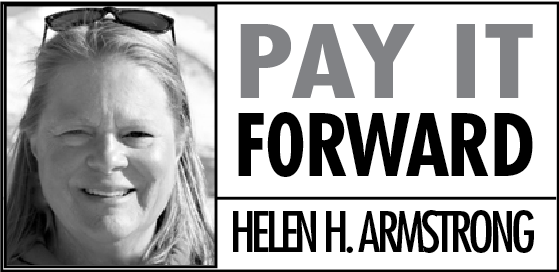I was 10 when I was first introduced to the concept of “paying it forward.” It started in 1954 with my uncle, Owen Jander, who was a conscientious objector and was sent to Germany. A year later Owen was sent to Jordan. In both places Owen experienced post-World War II hatred of Americans.
These experiences convinced him that we would never achieve world peace until we share in each other’s lives, learn each other’s customs and traditions, and grow to understand one another. These experiences also led Owen to decide in 1960 that rather than send birthday or Christmas presents to each of his nieces and nephews, he would do something special, something consistent with his belief in world peace. Thus began what he called “the Uncle Owen Plan.”
When we turned 10, we started saving our money for Owen to match. There were some rules: First, the money was to be spent only for living in a country where English is not the spoken language and before we finished college, because Owen believed young people are more receptive to new ways of seeing the world. Second, we should live with a family and go to school so that we would have meaningful contact with people. Third, he put a limit of $100 per year on the amount he would match.
The plan was simple, but the effects were profound. One of my sisters spent a year in Germany; the other sister lived in India. My cousin lived in France. In eighth grade my best friend hosted an AFS Intercultural Program exchange student from Norway and it was then that I knew I wanted to get involved with AFS. My family hosted girls from Malaysia and South Africa.
In 1972 I went to Finland to live for the year. Later my husband and I hosted Katrin from Austria. My husband and I continued the Uncle Owen Plan with our daughters; Anna went to Norway and Heidi to Chile. My nieces in Seward also were AFS students, to Turkey and to Portugal. Their family, too, has hosted twice.
Saving my money for eight years gave me immense satisfaction. I worked hard to be an exchange student; it was not something my parents paid for. Living abroad was the greatest gift anyone could ever have given me. It truly changed my life. Because of AFS and living in Finland I became fascinated with the Arctic, became a cultural anthropologist, and ended up in Alaska. And, I of course also fell in love with the joys of the sauna!
My Uncle Owen died in January 2015. When he died, I posted on Facebook how he had changed my life. The number of people who wrote to me astonished me. Friends who had hosted, volunteered or had been AFS students because of me thanked Uncle Owen for affecting their lives, even though they had never met him. Through Uncle Owen’s generous gift and idea, I became a part of the AFS family, and for the past 45 years I in turn have touched hundreds of students and families who have in turn touched hundreds of people. The people I knew in Finland, the students we hosted, the students and families I provided guidance to, the families who hosted because I encouraged them to, my daughters, my nieces, my friends — the list is incredibly long. Through Owen’s simple idea of encouraging me to save in order to live abroad, people’s lives have been affected, one person at a time, changing the world.
For me, it began with my uncle and I thank him with all my heart. We should all be an Uncle Owen for others, helping people realize their dreams, opening them up to our global community, helping to change the world, touch lives, and create a more just and peaceful world.
Helen H. Armstrong is a retired anthropologist living in Anchorage. She and her husband have a cabin in Homer.


